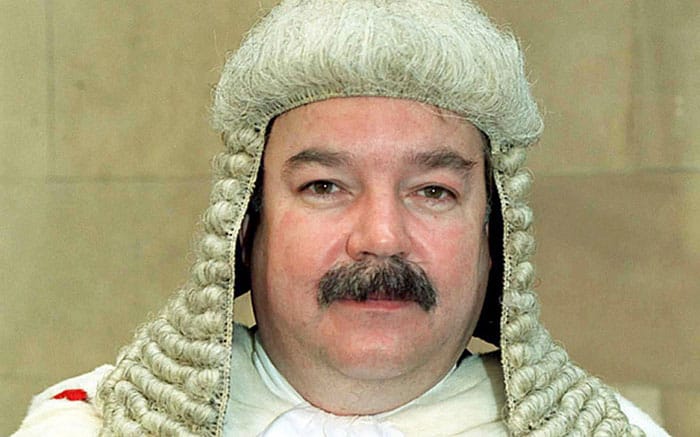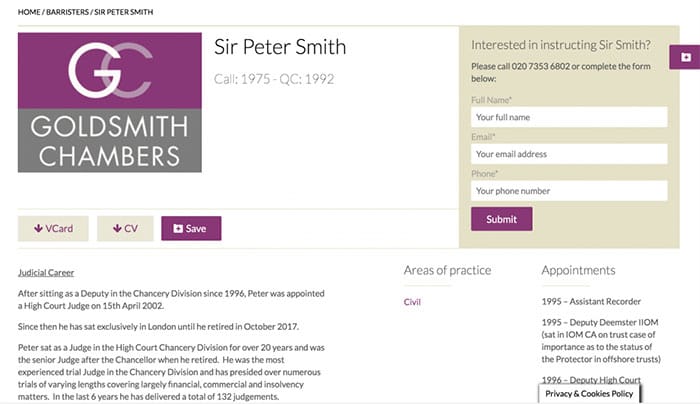He retired from the High Court amid controversy in 2017

Former High Court judge Sir Peter Smith QC, whose antics on the bench saw him retire just days before he was due to face a disciplinary tribunal in 2017, is back in the game.
Smith — of the notorious ‘lost luggage’ rant — has joined both Goldsmith Chambers in London and Fountain Chambers in Middlesborough as an associate member.
Despite being beset with controversy during his judicial career, and the longstanding convention that retired judges do not return to the bar, Fountain Chambers even says that Smith is “willing to consider appearing in contentious cases”.

A former academic, Smith sat in the Chancery Division for over 20 years. He was a deputy High Court judge from 1996 and stepped up full time in 2002.
In 2007, he hit the headlines for working a coded message into a high-profile judgment about Dan Brown’s best-selling novel The Da Vinci Code. Later that year, Smith was criticised by the Court of Appeal over his “intemperate” handling of a case involving Addleshaw Goddard — which he had unsuccessful discussions with over a job offer.
The Lord Chief Justice issued Smith with a reprimand for that, but said that “he has my full confidence”.
Smith nevertheless landed in hot water again for his bizarre “lost luggage” rant at the lawyers for British Airways during a hearing he was presiding over in 2015. The judge, annoyed that the airline had misplaced his baggage during a recent holiday, repeatedly demanded answers from BA’s barrister during a £3 billion case.
After Lord Pannick QC criticised Smith for this affair, the outraged jurist wrote to Pannick’s head of chambers to complain.
Smith spent 18 months suspended on full pay while the judicial authorities probed his behaviour, eventually standing down in October 2017 — days before he was due to appear before a disciplinary tribunal.
The eminent legal commentator Joshua Rozenberg, who followed the Smith saga for many years, has written that:
“Despite everything, I have some sympathy for Sir Peter Smith. A former lecturer at Manchester University, he was well regarded by members of the northern circuit and academic colleagues including Baroness Hale.”
But Rozenberg added “few doubt he has poor judgement, something of a drawback for a judge”.
That does not appear to bother Goldsmith Chambers, which has retained the services of Smith as a “chambers associate”. His Goldsmith profile records that:
“Peter has a reputation of being robust but fair and able to dispose of matters quickly with a pragmatic approach to them. He requires advocates to be able to argue their case and this disappoints some but those who are fully prepared and know their case relish the debate that takes place in front of him.”
Fountain Chambers, meanwhile, boasts that “Sir Peter, with his vast experience at the bar and on the bench, is available to accept instructions on a consultancy basis to evaluate cases and advise on strategy and presentation”.
It adds that he is “willing to consider appearing in contentious cases both in the UK and Abroad”. Smith is also listed as “practising” on the Bar Standards Board’s register of barristers.
While it is not unusual for retired senior judges to take on consultancy and mediation work, returning to the bar is frowned upon. As a House of Lords report puts it, “there is a long-standing convention which prevents full-time judges from returning to private practice after retiring from the bench”.
Lord Pannick even reports that “the terms of service of judges expressly state that the appointment is ‘made on the understanding that appointees will not return to practise’ at the bar” — although he, like many others in the profession, thinks that the convention is outdated.
A spokesperson for Goldsmith Chambers said “he will not be able to practice at the Bar at Goldsmith Chambers. He is an Associate Tenant only”. Fountain Chambers has been approached for comment.